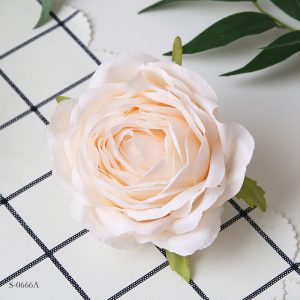An “artificial rose” generally refers to a synthetic or man-made version of a natural rose flower. Artificial roses are commonly created for various purposes, such as decorative items, crafts, events, and even as substitutes for real roses in situations where the latter may not be feasible due to longevity or maintenance concerns. Here are some features and aspects associated with artificial roses:
- Materials: Artificial roses can be made from a variety of materials, including silk, polyester, plastic, foam, and more. These materials are chosen to closely resemble the texture and appearance of real rose petals and leaves.
- Realism: The goal of artificial roses is to mimic the appearance of real roses as closely as possible. Advanced manufacturing techniques and high-quality materials allow for intricate detailing, vibrant colors, and realistic textures.
- Durability: Unlike real roses that wilt and decay over time, artificial roses are designed to be long-lasting. They can retain their appearance and shape for years if properly cared for.
- Variety: Artificial roses come in a wide range of colors, sizes, and styles. This variety allows for customization to suit specific preferences and occasions.
- Maintenance: Artificial roses require minimal maintenance compared to real flowers. They don’t need water, sunlight, or pruning. Occasional dusting or cleaning might be necessary to keep them looking their best.
- Versatility: Artificial roses are used in various contexts, such as home décor, weddings, parties, and other events. They can be incorporated into floral arrangements, bouquets, centerpieces, wreaths, and more.
- Allergen-Free: For individuals with allergies to pollen or certain scents, artificial roses provide a pollen-free and scent-free alternative while still offering the beauty of flowers.
- Non-Seasonal: Natural roses are often seasonal, but artificial roses are available year-round, allowing people to enjoy their beauty regardless of the time of year.
- Symbolism: Just like real roses, artificial roses can carry symbolic meanings. For example, red roses can symbolize love and passion, while white roses can symbolize purity and innocence.
- Eco-Consciousness: While the production of artificial flowers involves manufacturing processes, they can be considered more eco-friendly than the constant cultivation and transportation of fresh flowers, especially when the latter involves excessive pesticide use and carbon emissions.
- Cost: While high-quality artificial roses can be an investment upfront, they can ultimately be more cost-effective than buying fresh roses repeatedly, especially for long-term decorative purposes.
- Crafting: Artificial roses are popular in crafting and DIY projects. They can be used in making greeting cards, scrapbooks, hair accessories, and more.
It’s important to note that the quality and realism of artificial roses can vary widely based on the manufacturing process and the materials used. High-quality artificial roses tend to be more convincing in appearance, while lower-quality options might not capture the beauty of real roses as effectively.
























